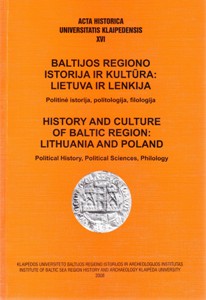Volume 16 (2008): Baltijos regiono istorija ir kultūra: Lietuva ir Lenkija. Politinė istorija, politologija, filologija = History and Culture of Baltic Region: Lithuania and Poland. Political History, Political Sciences, Philology, January 2008

Order by:
Pub. online: 15 Jan 2008
Type: Article
 Open Access
Open Access
Journal:
Acta Historica Universitatis Klaipedensis
Volume 16 (2008): Baltijos regiono istorija ir kultūra: Lietuva ir Lenkija. Politinė istorija, politologija, filologija = History and Culture of Baltic Region: Lithuania and Poland. Political History, Political Sciences, Philology, pp. 201–209
Abstract
Pub. online: 15 Jan 2008
Type: Article
 Open Access
Open Access
Journal:
Acta Historica Universitatis Klaipedensis
Volume 16 (2008): Baltijos regiono istorija ir kultūra: Lietuva ir Lenkija. Politinė istorija, politologija, filologija = History and Culture of Baltic Region: Lithuania and Poland. Political History, Political Sciences, Philology, pp. 211–218
Abstract
Pub. online: 15 Jan 2008
Type: Article
 Open Access
Open Access
Journal:
Acta Historica Universitatis Klaipedensis
Volume 16 (2008): Baltijos regiono istorija ir kultūra: Lietuva ir Lenkija. Politinė istorija, politologija, filologija = History and Culture of Baltic Region: Lithuania and Poland. Political History, Political Sciences, Philology, pp. 219–224
Abstract
Pub. online: 15 Jan 2008
Type: Article
 Open Access
Open Access
Journal:
Acta Historica Universitatis Klaipedensis
Volume 16 (2008): Baltijos regiono istorija ir kultūra: Lietuva ir Lenkija. Politinė istorija, politologija, filologija = History and Culture of Baltic Region: Lithuania and Poland. Political History, Political Sciences, Philology, pp. 225–230
Abstract
Pub. online: 15 Jan 2008
Type: Article
 Open Access
Open Access
Journal:
Acta Historica Universitatis Klaipedensis
Volume 16 (2008): Baltijos regiono istorija ir kultūra: Lietuva ir Lenkija. Politinė istorija, politologija, filologija = History and Culture of Baltic Region: Lithuania and Poland. Political History, Political Sciences, Philology, pp. 231–237
Abstract
Pub. online: 15 Jan 2008
Type: Article
 Open Access
Open Access
Journal:
Acta Historica Universitatis Klaipedensis
Volume 16 (2008): Baltijos regiono istorija ir kultūra: Lietuva ir Lenkija. Politinė istorija, politologija, filologija = History and Culture of Baltic Region: Lithuania and Poland. Political History, Political Sciences, Philology, pp. 239–246
Abstract
Pub. online: 15 Jan 2008
Type: Article
 Open Access
Open Access
Journal:
Acta Historica Universitatis Klaipedensis
Volume 16 (2008): Baltijos regiono istorija ir kultūra: Lietuva ir Lenkija. Politinė istorija, politologija, filologija = History and Culture of Baltic Region: Lithuania and Poland. Political History, Political Sciences, Philology, pp. 247–255
Abstract
Pub. online: 15 Jan 2008
Type: Discussion
 Open Access
Open Access
Journal:
Acta Historica Universitatis Klaipedensis
Volume 16 (2008): Baltijos regiono istorija ir kultūra: Lietuva ir Lenkija. Politinė istorija, politologija, filologija = History and Culture of Baltic Region: Lithuania and Poland. Political History, Political Sciences, Philology, pp. 257–260
Abstract
Pub. online: 15 Jan 2008
Type: Book Review
 Open Access
Open Access
Journal:
Acta Historica Universitatis Klaipedensis
Volume 16 (2008): Baltijos regiono istorija ir kultūra: Lietuva ir Lenkija. Politinė istorija, politologija, filologija = History and Culture of Baltic Region: Lithuania and Poland. Political History, Political Sciences, Philology, pp. 261–262
Pub. online: 15 Jan 2008
Type: Discussion
 Open Access
Open Access
Journal:
Acta Historica Universitatis Klaipedensis
Volume 16 (2008): Baltijos regiono istorija ir kultūra: Lietuva ir Lenkija. Politinė istorija, politologija, filologija = History and Culture of Baltic Region: Lithuania and Poland. Political History, Political Sciences, Philology, pp. 263–264